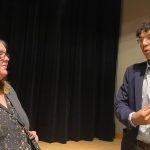The ACT Science section isn’t actually a test of science knowledge—it’s a test of data interpretation, critical thinking, and time management. Yet for many high school students in New York City, this part of the test continues to be one of the hardest.
Despite being strong in academics, NYC students often walk out of the ACT saying, “That science section was nothing like what we learn in school!” And they’re right.
The Misconception: “I’m good at science, so this will be easy for me to ace the ACT”
Many NYC students take multiple science courses—like Regents Biology, Chemistry, or AP Physics—so they assume they’ll ace the ACT Science section. But this test isn’t about memorizing facts. Instead, it’s about:
- Analyzing unfamiliar experiments
- Reading graphs and scientific passages quickly
- Applying logic to conflicting viewpoints
- Making inferences from incomplete data
Without specific training, even students from schools like Stuyvesant or Bronx Science find themselves unprepared.
Time Pressure Is a Major Factor
The ACT Science section gives students only 35 minutes to answer 40 questions across 6–7 passages. That’s less than a minute per question—and most involve dense scientific data, complex charts, and multiple steps.
NYC students are often trained for deep analysis and academic rigor. But the ACT Science section rewards speed + strategy, not depth. That disconnect causes many to run out of time, even if they understand the material.
Lack of Exposure to ACT-Specific Formats
Unlike the SAT, the ACT Science section is not part of school curricula in NYC public or private schools. Without focused prep, most students never see this type of question structure:
- Comparative viewpoints
- Experimental design interpretation
- Data trend prediction
This means they’re encountering a whole new test format—with no prep built into their school experience.
How Kapdec Helps NYC Students Improve ACT Science Scores
At Kapdec, we’ve worked with hundreds of NYC students to break down the ACT Science section into manageable strategies. Our method focuses on:
- Timing drills to build speed without panic
- Scientific reasoning hacks to answer without full comprehension
- Passage-specific approaches (e.g., graphs vs. hypotheses)
- Practice with real ACT-style questions, not textbook problems
Kapdec’s results show score jumps of 3–6 points in the Science section alone after just a few weeks of guided prep.
FAQ: ACT Science Struggles in NYC
1. Why do NYC students find the ACT Science section so hard?
Many NYC students are used to learning science in a traditional, content-heavy format where memorization and textbook knowledge are prioritized. But the ACT Science section is less about what you know and more about how quickly you can interpret unfamiliar data, graphs, and experimental scenarios. Students often walk into the test expecting biology or chemistry questions but instead face abstract charts and confusing experiments that require fast logic and decision-making—not rote learning. This mismatch can create unnecessary anxiety and lower scores.
2. Do you need to memorize science concepts for the ACT Science section?
Surprisingly, no. The ACT Science section isn’t testing whether you remember specific facts or scientific formulas—it’s testing your ability to read and analyse scientific information on the spot. All necessary data is provided in the passage, so even if you’re unfamiliar with the topic, you can still answer the question by focusing on trends, labels, and relationships in the figures or tables. This can be both a relief and a challenge for students trained to memorize rather than interpret.
3. What type of questions are in the ACT Science section?
The section typically consists of 6–7 short science passages, each followed by 5–7 multiple-choice questions. These passages include data representation (charts and graphs), research summaries (experimental setups), and conflicting viewpoints (two or more scientists disagreeing on a theory). Questions ask you to find patterns in graphs, compare results from different experiments, and understand scientific reasoning. This variety means students must quickly adjust their approach from one passage to the next.
4. How can NYC students improve their ACT Science scores?
Improvement comes with strategy. First, students should practice reading scientific graphs and tables efficiently, since most ACT questions rely on visual data rather than long reading passages. Second, timed drills help students manage the fast-paced nature of the test. Finally, targeted tutoring platforms like Kapdec offer structured lessons, practice tests, and performance analytics that show exactly where a student is struggling—making preparation more focused and results more measurable.
5. Why is time management so important in the ACT Science section?
Students have just 35 minutes to answer 40 questions—less than a minute per question. Many struggle not with the difficulty of the questions, but with the sheer speed required to process dense information and still think critically. Without proper time management strategies, students often leave several questions blank or guess randomly at the end. Learning to skim for relevant data and ignore distractions is key to maximizing score potential.
6. Is the ACT Science section harder than the SAT Reading/Math?
It depends on the student, but many say yes, especially because it’s a unique type of challenge. Unlike SAT Math, which follows a predictable curriculum, or SAT Reading, which involves familiar comprehension skills, ACT Science demands rapid problem-solving with unfamiliar scientific concepts. For students not used to data-based reasoning, this can feel overwhelming at first. However, with consistent practice, many find the ACT Science section becomes easier to conquer than they expected.
Final Thought
The ACT Science section is tough—but not because NYC students lack science knowledge. It’s because the skills tested aren’t taught in class. With targeted practice and smart prep from platforms like Kapdec, students can turn this tricky section into a scoring advantage.


